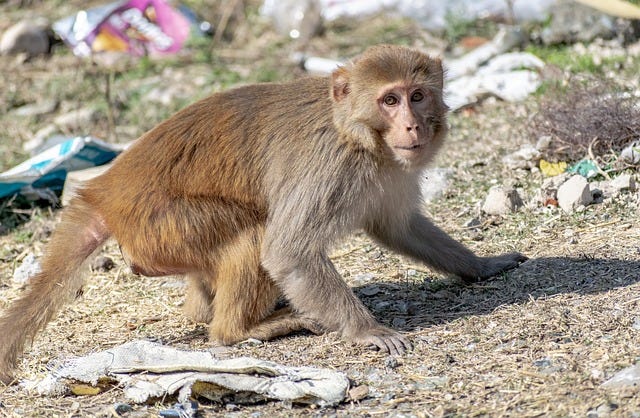Hong Kong health officials reported this week on the investigation into a case of human infection of Herpes B virus (also known as herpes simiae virus), and urged the public to refrain from touching or feeding wild monkeys to minimize the risk of contracting the virus.

The case involves a 37-year-old male with good past health, who was admitted to Yan Chai Hospital through accident and emergency department on March 21 due to fever and decreased conscious level. He is now receiving treatment at the Intensive Care Unit of the hospital and his condition is critical. Cerebrospinal fluid specimen of the patient tested positive for B virus by the Public Health Laboratory Services Branch of the CHP today.
According to the information provided by his family members and preliminary investigations, the patient had contacts with wild monkeys and was wounded by them during his visit to Kam Shan Country Park in late February. Epidemiological investigations are ongoing.
Officials with the Centre for Health Protection (CHP) of the Department of Health (DH) say this is the first Herpes B virus human infection case recorded by the CHP.
Herpes B cases have been reported in the US and Canada. Japan reported their first case in 2019 and Mainland China reported their first case in 2021.
B virus infection is caused by a herpes virus. B virus is also commonly referred to as herpes B, monkey B virus, herpesvirus simiae, and herpesvirus B.
The virus is found among macaque monkeys, including rhesus macaques, pig-tailed macaques, and cynomolgus monkeys (also called crab-eating or long-tailed macaques). Macaque monkeys are thought to be the natural host for the virus.
The CDC notes infection with B virus is extremely rare in humans. When it does occur, the infection can result in severe brain damage or death if the patient is not treated soon after exposure. Infection in humans is typically caused by animal bites or scratches or by mucosal contact with body fluid or tissue.
Untreated B virus infections in humans result in an extremely high mortality rate (∼80%) and, consequently, present unique and potentially lethal challenges for individuals handling macaque monkeys or macaque cells and tissues.
A CHP spokesman said to minimize risk of acquiring B virus, members of the public are advised to note the following:
Stay away from wild monkeys and avoid touching or feeding them;
In case there are wounds caused by monkeys, wash the wound with running water and seek medical attention immediately.




